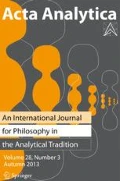Abstract
We can address the issue of epistemic luck, the possibility that the world interferes with the activity of believing so as to keep that activity from achieving its aim, by rethinking the aim of that activity. So, if we give up truth, for example, as the aim of belief, and if we embrace a different aim—the aim of believing as my ideal self would have me believe—we can eliminate the possibility of luck and leave the world no room to interfere in the affairs of the activity of believing. All this while at the same time preserving the epistemic’s responsiveness to the world. This way of seeing the epistemic is culled from the work of Kierkegaard’s pseudonyms.
Similar content being viewed by others
Notes
This is a lesson we are meant to learn from arguments for moral luck, which aim to show that we hold people morally responsible for their actions even when it is simply a matter of luck—that is, simply a matter of the world’s influencing the outcomes of our actions in ways that we cannot control—that their actions have the outcomes that they have. The contemporary discussion of moral luck is thought to have begun with the 1976 contributions of Williams (1976) and Nagel (1976).
I explore a Kierkegaardian resolution to this dilemma in Black (2018).
See Goldman (1976).
See, for example, Pritchard (2005), p. 71.
See Pritchard (2005), p. 153.
See Pritchard (2005), p. 163.
See Pritchard (2007), pp. 290–292.
Kierkegaard (1993), p. 17. When I have an external aim, Kierkegaard says elsewhere, I am “turned outward in hankering for and seeking after the surrounding world that is [my] object” (Kierkegaard (1992b), p. 314). Judge William, the pseudonymous author of the second volume of Either/Or, echoes this, saying that an external aim “lies outside the individual” (Kierkegaard (1987), p. 180).
Kierkegaard (1987), p. 174.
See, for example, Feldman (2002), pp. 378–379.
See Kvanvig (2003).
See Wright (2014).
Kierkegaard (1987), p. 262.
Kierkegaard (1987), p. 259. This view is explicit in the pseudonymous works. In The Sickness Unto Death, Kierkegaard has his pseudonym Anti-Climacus say, “The self is the conscious synthesis of infinitude and finitude, which relates to itself, whose task is to become itself” (Kierkegaard (1980), pp. 29–30). Judge William adds that “I must be the universal at the same time as I am the particular,” in which case “the dialectic of duty resides within me” (Kierkegaard (1987), p. 264) and, given that I am engaged in a project with internal aims, my task is to “transform [my]self into the universal individual” (Kierkegaard (1987), p. 261). Kierkegaard himself agrees: he says in his own voice that one has a task “to gain his soul” and that this is “a task that announce[s] a struggle with the whole world” (Kierkegaard (1992b), p. 167).
See Kierkegaard (1987), p. 263.
Kierkegaard (1987), p. 259.
A fuller quotation is helpful here: “the individual has [the ideal self] outside himself as the image in whose likeness he is to form himself, and which on the other hand he has within himself, since it is he himself. Only within himself does the individual have the objective toward which he is to strive, and yet he has this objective outside himself as he strives toward it” (Kierkegaard (1987), p. 259).
Kierkegaard (1992a), p. 92.
Kierkegaard (1992a), p. 399.
Kierkegaard (1992a), p. 73.
Kierkegaard (1987), p. 174.
I do not mean to suggest that the scope of my proposal includes only believing over which we have some measure of control. See the discussion of reflexive believing below.
Kierkegaard (1987), pp. 220–221.
Kierkegaard (1992a), pp. 135–136.
References
Black, T. (2018). Action and luck in the Kierkegaardian ethical project. International Philosophical Quarterly, 58, 295–310.
Feldman, R. (2002). Epistemological duties. In P. Moser (Ed.), The Oxford handbook of epistemology (pp. 362–384). Oxford University Press.
Goldman, A. I. (1976). Discrimination and perceptual knowledge. The Journal of Philosophy, 73, 771–791.
Horwich, P. (2006). The value of truth. Noûs, 40, 347–360.
Kant, I. (1998). Groundwork of the Metaphysics of Morals. Cambridge University Press.
Kierkegaard, S. (1980). The sickness unto death, ed. and trans. Howard V. Hong and Edna H.Hong. Princeton University Press
Kierkegaard, S. (1987). Either/or, volume 2, ed. and trans. Howard V. Hong and Edna H. Hong.Princeton University Press.
Kierkegaard, S. (1992a). Concluding unscientific postscript to Philosophical Fragments, volume 1, ed. and trans. Howard V. Hong and Edna H. Hong. Princeton University Press.
Kierkegaard, S. (1992b). Eighteen upbuilding discourses, ed. and trans. Howard V. Hong and Edna H. Hong. Princeton University Press.
Kierkegaard, S. (1993). Three discourses on imagined occasions, ed. and trans. Howard V. Hong and Edna H. Hong. Princeton University Press.
Kornblith, H. (1993). Epistemic normativity. Synthese, 94, 357–376.
Kvanvig, J. (2003). The value of knowledge and the pursuit of understanding. Cambridge University Press.
Millikan, R. G. (1984). Language, thought, and other biological categories. MIT Press.
Nagel, T. (1976). Moral luck. Proceedings of the Aristotelian Society, Supplementary Volumes, 50, 137–151.
Papineau, D. (1999). Normativity and judgment. Proceedings of the Aristotelian Society, 73, 16–43.
Pritchard, D. (2005). Epistemic luck. Oxford University Press.
Pritchard, D. (2007). Anti-luck epistemology. Synthese, 158, 277–297.
Sosa, E. (1999). How to defeat opposition to Moore. Philosophical Perspectives, 13, 141–154.
Williams, B. (1976). Moral luck. Proceedings of the Aristotelian Society, Supplementary Volumes, 50, 115–135.
Wright, S. (2014). The dual-aspect norms of belief and assertion: A virtue approach to epistemic norms. In C. Littlejohn and J. Turri (Eds.), Epistemic norms: New essays on action, belief, and assertion (pp 239–258). Oxford University Press.
Author information
Authors and Affiliations
Corresponding author
Additional information
Publisher's note
Springer Nature remains neutral with regard to jurisdictional claims in published maps and institutional affiliations.
Rights and permissions
About this article
Cite this article
Black, T. A Kierkegaardian Anti-Luck Epistemology. Acta Anal 37, 85–97 (2022). https://doi.org/10.1007/s12136-021-00484-y
Received:
Accepted:
Published:
Issue Date:
DOI: https://doi.org/10.1007/s12136-021-00484-y


